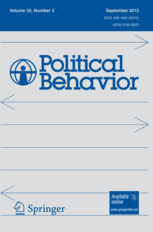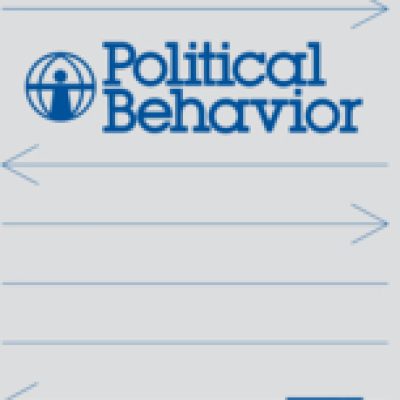No Country for Asylum Seekers? How Short-Term Exposure to Refugees Influences Attitudes and Voting Behavior in Hungary
Abstract
How does exposure to refugees influence political behavior? We present evidence from Hungary, a country with widespread anti-immigration attitudes, that short term exposure during the 2015 refugee crisis predicts anti-refugee voting and sentiment. We code exposure to refugees at the settlement level using reports from state media, an independent online news site, and an online social media aggregator. Settlements through which refugees traveled showed significantly higher anti-refugee voting in a national referendum in 2016. The effect decreases sharply with distance. Using a difference-in-differences model, we find that the far-right opposition gained, while the governing right-wing party lost votes in these settlements in subsequent parliamentary elections. This suggests incumbents are punished by voters skeptical of immigration regardless of their policy position. Survey data supports this finding of a competition among right-wing parties, as individuals in exposed settlements are more fearful of immigrants and support restrictive policies only if they identify as right-wing.
The issue of migration has moved to the core of the European political conversation since the 2015 refugee crisis. It is likely to stay on the agenda as subsequent years have set new records for the highest number of people forcibly displaced and searching refuge on record (UNHCR 2020). Despite the broad political salience of the issue, the local circumstances framing the encounters that natives have with refugees and immigrants vary widely. For instance refugees may seek to settle in a country or may just be passing through. In the latter case we can expect greater geographic differences in the likelihood of natives encountering refugees and that interactions between natives and refugees are brief and one-time. In such situations, political elites including governments have a critical role: some scapegoat immigrants rather than sanctioning positive engagement. Thereby, they can frame the context in which refugees make first impressions on voters in a negative light (Harteveld et al. 2017; Ivarsflaten 2005). As populist and radical right parties hostile to immigration become more successful and increasingly participate in government (Kaltwasser et al. 2017; Bustikova 2017), it is important to observe how voters react to nativist appeals when they come from parties in government, and how such responses are conditional on previous political attitudes and actual encounters with refugees.
In this paper we present evidence that exposure to refugees during the 2015 European refugee crisis affected political behavior in Hungary, a country at the center of the crisis, given the large number of refugees entering the country and its government’s nativist response. The Hungarian case differs from those used in recent work to examine the effect of contact with refugees on native political behavior (Hangartner et al. 2018; Dinas et al. 2019; Steinmayr 2020) because refugees were passing through the country in an irregular manner and their interactions with locals were highly transient. Indeed, because of staggered border closures, changing opportunities to travel by train or bus, and spontaneous decisions of groups of refugees to try to reach Austria on foot, many Hungarian settlements were only exposed to refugees on a single occasion. Another unique aspect of the Hungarian case is that the ruling Fidesz party, led by Viktor Orbán, mobilized radically against the refugees in the aftermath of the crisis. Migration became the central question of Hungarian politics in subsequent years (Krekó and Enyedi 2018). The share of Hungarians who named immigration as one of the country’s most important problems increased from close to zero in mid 2013 to over thirty percent in November 2015 (European Commission 2016) and has remained high ever since.
Shortly after the crisis, Hungary held a national referendum on proposed EU refugee quotas. We use this vote to measure the effect of short-term contact with refugees on voting behavior at the settlement (municipality) level. The results of the referendum allow us to more directly measure anti-refugee sentiment than previous studies which use far-right party outcomes as a proxy (Dinas et al. 2019; Steinmayr 2020; Dustmann et al. 2018; Vertier and Viskanic 2018). We find a significant backlash effect: settlements exposed to the crisis were significantly more likely to vote against the EU quota in the referendum.
Though Fidesz won a significant victory in the 2018 parliamentary elections with a campaign centered on the topic of migration, we observe an interesting difference in voting trends from the 2014 elections among exposed and non-exposed settlements. In settlements exposed to the refugee crisis, there was a small but significant move from Fidesz towards the far-right opposition Jobbik party, which also took a hardline anti-refugee stance during the campaign. This suggests that beyond the issue-ownership theory favored by previous work (Dinas et al. 2019), there is an anti-incumbent aspect to anti-refugee voting induced by exposure to crisis which ruling parties cannot exploit. Voters inflamed by direct exposure seem to punish the ruling party (see also Bratti et al. 2020).
We find further evidence that exposure influences voting behavior only among right-wing voters using survey data collected between the crisis and referendum. We confirm that individuals from exposed settlements are more likely to express anti-refugee policy preferences, but find that this is conditional on voting for parties on the right.
We proceed by outlining a theoretical framework for understanding the effect of exposure to the refugee crisis on voting behavior and reviewing related work. After describing the specifics of our case, we present our data and modelling strategy. We then proceed to test the impact of short-term exposure to refugees in different settings: its effect on voting in the national anti-refugee referendum, the electoral outcomes of two anti-refugee parties (one in government, one in opposition) in parliamentary elections before and after the crisis, and individual-level survey responses collected shortly after the crisis.
⇒ Tovább a teljes tanulmányra



